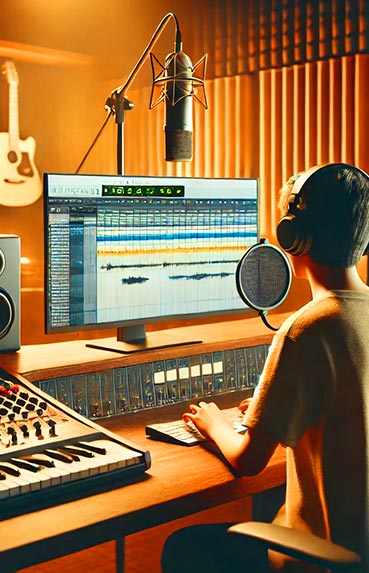The film industry has undergone an unprecedented transformation thanks to the incorporation of artificial intelligence (AI). This technology is not only redefining how visual effects are created, but it is also revolutionizing the way scripts are written and developed. From the initial steps in post-production to the development of complex stories, AI is establishing itself as an essential tool for filmmakers worldwide.
The Revolution of Visual Effects
The Evolution of Special Effects
Visual effects have been an integral part of cinema since its inception, but the introduction of AI has taken this discipline to new heights. AI algorithms allow for the creation of more realistic and detailed effects than ever before. A clear example is the use of generative neural networks to simulate natural phenomena like fire, water, or even crowd behavior.
Efficiency in Production: Before AI, creating complex visual effects required months of work by entire teams of artists and technicians. Now, with the help of AI, these processes can be significantly accelerated, allowing filmmakers to focus on more creative aspects of production.
Cost Reduction: The automation of complex tasks thanks to AI not only saves time but also reduces costs. This has enabled even lower-budget productions to access high-quality visual effects.
Practical Applications in Modern Cinema
A notable example is the use of AI to de-age actors on screen. Films like Martin Scorsese's "The Irishman" used AI to alter the appearance of actors, allowing them to portray their characters at different stages of their lives. This type of technology opens up a range of creative possibilities, enabling filmmakers to tell stories that were previously impossible to visualize.
Additionally, AI is also used to enhance image quality. Advanced algorithms can restore old films, eliminating imperfections and improving resolution to meet modern viewers' demands.
AI-Generated Scripts
The Role of AI in Scriptwriting
AI is not only transforming the visual aspect of cinema but is also venturing into the narrative realm. AI programs are now capable of analyzing large volumes of text to identify effective narrative patterns and structures. This is leading to the creation of tools that can assist screenwriters in developing stories.
Trend Analysis: AI can analyze audience preferences and predict what types of stories might resonate most with viewers. This allows screenwriters to tailor their narratives to maximize emotional impact.
Idea Generation: Through natural language processing, AI programs can generate story ideas from a simple premise provided by the screenwriter. While these ideas still require human intervention to be polished, they offer a valuable starting point.
Success Stories and Challenges
An example of AI use in scriptwriting is the film "Sunspring," whose script was entirely written by an artificial intelligence program. Although the result was an abstract and sometimes incoherent story, it demonstrated AI's potential to participate in the creative process.
However, AI still faces significant challenges in the realm of narrative creativity. The ability to understand emotional and contextual nuances remains an area in development. Human screenwriters continue to be essential in bringing depth and life to stories.
AI in Post-Production
Optimization of Editing and Assembly
In post-production, AI is revolutionizing how film editing and assembly are conducted. Machine learning algorithms can analyze large amounts of footage to identify the best takes and sequences, easing the workload of editors.
Automation of Repetitive Tasks: AI can handle tedious tasks like organizing clips, synchronizing audio, and color correction, freeing up editors to focus on more complex creative decisions.
Predictive Editing: Using historical data, AI algorithms can predict what type of editing might work best for a particular scene, suggesting cuts and transitions that could enhance the visual narrative.
Enhancement of Image and Sound Quality
Another area where AI is making a significant impact is in improving image and sound quality. Deep learning technology allows for the restoration and enhancement of old images, removing background noise, and optimizing sound quality.
Remastering Classics: Classic films can be remastered to meet modern standards, allowing new generations to enjoy these works with image and sound quality that was previously unimaginable.
Immersive Sound: Advanced algorithms can analyze sound to create more immersive auditory experiences, enhancing viewer perception and increasing the emotion of key scenes.
Ethical and Creative Challenges
Intellectual Property and Copyright
The growing involvement of AI in creating film content raises complex questions about intellectual property and copyright. Who is the true author of a work created in part by a machine? This is an ongoing debate that the industry must address to ensure human creators receive proper recognition and compensation for their work.
Impact on Employment
While AI offers numerous advantages, it also raises concerns about its impact on employment within the film industry. The automation of tasks could reduce the need for certain technical and creative roles, leading to a reevaluation of how jobs are distributed in the sector.
- Training and Adaptation: It's crucial for film professionals to adapt to this new environment by acquiring skills that allow them to work alongside AI technologies. Continuous training and professional development will be essential to remain relevant in the job market.
The Role of Human Creativity
Despite advances in AI, human creativity remains irreplaceable. The ability to understand complex emotions, develop deep characters, and tell meaningful stories is something machines still cannot fully replicate. Collaboration between humans and machines has the potential to enrich the creative process, but the initial spark of creativity remains a human quality.
The interaction between artificial intelligence and human creativity is fertile ground for innovation in cinema. By embracing this synergy, the industry can reach new heights of artistic expression.
Tips for Filmmakers Looking to Incorporate AI
Explore Available Tools: Research and experiment with AI tools available on the market. From editing software to writing programs, AI offers a wide range of possibilities to enhance your creative process.
Continuous Learning: Stay updated on the latest AI developments and how they apply to the film industry. Participating in courses and workshops will allow you to acquire new skills and make the most of these technologies.
Collaboration with AI Experts: Consider working with AI experts to effectively integrate these technologies into your projects. Interdisciplinary collaboration can open new creative and technical opportunities.
Ethics and Responsibility: Reflect on the ethical implications of using AI in your work. Ensure that you respect the rights of human collaborators and consider how AI might affect the narrative and message of your films.
Creative Innovation: Don't be afraid to experiment and explore new ways of storytelling. AI can be a powerful tool for expanding the boundaries of cinematic narrative, but always remember that human creativity is the heart of any great film.
In summary, artificial intelligence is transforming the film industry in ways unimaginable just a few decades ago. From enhancing visual and sound quality to participating in script creation, AI is leaving an indelible mark on the art of cinema. By adopting these technologies with responsibility and creativity, filmmakers can open new doors to innovation and storytelling.

















